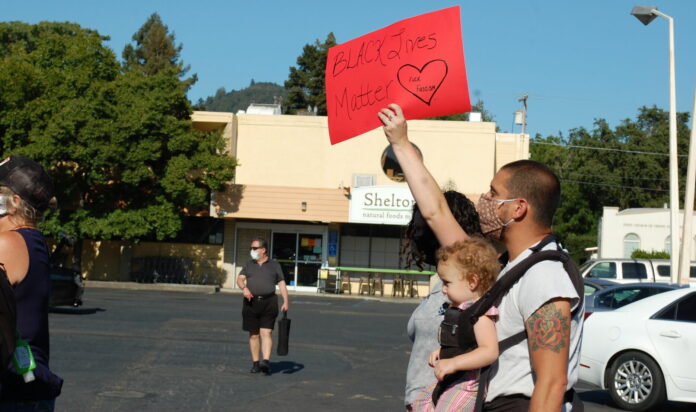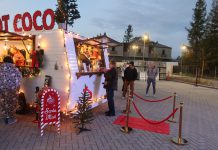A lively group of marchers with musical instruments, shakers and hand-made signs made their way down Center and Johnson Streets Friday evening, July 31, celebrating the progress and diversity that’s come from sustained civil disobedience and calling for further equality and justice for George Floyd and the deaths of many other Black, Indigenous and people of color at the hands of law enforcement.
“The main message is to celebrate and bring recognition to the progress that has been made,” said Hollie Clausen, one of the event organizers. “We were chanting in the first few protests in Healdsburg to remove Leah Gold from her seat and that pretty much happened right away and I just want to acknowledge the work of the community and within a week she resigned and then there was an empty seat left and so now that’s filled with the first LGBTQ+ and Latinx man that’s ever served on the city council, so that’s really exciting. We’re just striving for more diverse representation and really represent the needs of everyone.”
Clausen, with the help of a few lead drummers, led a group of families, residents and activists down Center Street from where they gathered in the Plaza, to Johnson Street, down Powell and to the Healdsburg Elementary Fitch Mountain campus.
While facial coverings and masks may have muffled the groups chants a bit, the vivacious crowd made their voices heard, chanting “Say her name, Breonna Taylor” and “Fire, fire gentrifier, Black people used to live,” as they wound their way down through the neighborhood.
Children raised their hand-drawn signs, people made noise with maracas and drums and one attendee even walked on stilts as curious neighbors peeked their head out their doors, clapping and cheering on the protestors. One small dog even got loose and tried to join the protestors, much to the dismay of its owner.
The youth organizer of the event, Izabel Soto, also led the crowd in chants and hopped up on a rented U-Haul pickup truck at the front of the march to chant with Clausen.
In an interview with Soto prior to the event, she said they wanted to have a musical element to the march because music has always been an important part of many different cultures.
“Music has been a very cultured thing for African Americans and for different cultures and also I think it’s important to have a musical march because you get the message out there in a different way. Many people think this is like a trend and so I think it’s important to come up with different ways to get people out there,” she said.
Once the group reached the lawns at the Fitch Mountain campus, Corazon Healdsburg was there to help people with voter registration if needed and people handed out water bottles, and hand sanitizer and masks if needed.
This kicked off the “teach-in” portion of the event, where speakers Christian Sullberg of Positive Images, City Councilmember Ozzy Jimenez and civil rights attorney Patrick Gomez Buelna, spoke about racism, mental health and LGBTQ+ resources, and civil rights.
“The teach-in part of it is important because it’s important to see what’s going on and to understand what is happening in America,” Soto said. “What happened with Breonna Taylor, is people stopped talking about her. It’s been (four months) since she was killed and the police who killed her are still not in jail, so I think we need to keep talking about it, keep having events and keep doing things to let the government and the system know we are not going to forget about it and we are going to keep fighting.”
Soto said she believes education is the number one power you can have. Clausen added that she hopes people will come away with a better understanding of what defunding the police means and that it’s about reallocating funds to other vital resources like education and affordable housing.
Sullberg was the first to speak and shared some opening remarks about his solidarity with the Black Lives Matter movement and with his work with the Santa Rosa advocacy group, Positive Images.
“I’ve been working with the LGBTQ+ youth and young adults for the last six years now and I personally know the feeling of not having space in our society, feeling extremely isolated and the feeling of not being accepted and respected, being seen as less than and watching each day as our rights are being stripped away with each executive order that Trump signs off on in his ivory tower,” Sullberg said. “I believe that having free access to mental health support groups, mental health resources and space for our queer, trans and LGBTQI+ here in Sonoma County is of the utmost importance now more than ever. I believe that protesting is the most American thing that we can do in the face of injustice. I believe that Black lives matter, I believe that Black trans lives matter.”
He introduced his partner, councilmember and Noble Folk owner, Jimenez.
“Some time ago, folks in a decision-making roll were uncomfortable about saying Black lives matter and so today as a city councilmember and as a representative of our city I want to thank you and show solidarity with everything that is going on today,” Jimenez said.
Jimenez also shared a little bit about his backstory growing up in Sonoma County as a member of the LGBTQ+ and Latinx community.
“I grew up here in Sonoma County and I faced so many racial injustices. When I was young my family and I lived in an apartment complex right near the fairgrounds in Santa Rosa and at the time, I was undocumented and my father did the most American thing, just like protesting, he went and got his American citizenship, so at the age of 15 I became an American citizen and I am here today to speak up for those that don’t have a voice,” he said.
Buelna, an Oakland based civil rights attorney, discussed the disparities he witnessed growing up in Healdsburg and how it inspired him to become a civil rights attorney.
“I’m a civil rights lawyer from the Bay Area, but I was born and raised here and probably the seed for what made me want to become a civil rights lawyer started here. My stepfather was a police officer here and he took me on a ride-along once to sort of scare me and he was waiting next to Giorgi Park at a stop sign to ticket someone for coming to an incomplete stop. As people passed, parents were driving their kids to school, they were rolling the stop signs and he didn’t stop anyone and I said, ‘Why aren’t you stopping these people?’ and he just ignored me and then he saw a well-worn red Honda Civic with a Mexican family inside and he decided that that was the car he was going to stop,” Buelna said.
His stepfather ticketed the Civic driver and had him get out of the car on the premise that he could have weapons when all he was doing was simply just driving his kids to school.
“My stepfather returned to the car and I asked him, ‘Why did you do that?’ and he said, ‘Some people need to get stopped,’” Buelna said.
He said that small moment made him realize that this scenario happens many times a day in different forms and Buelna eventually became a civil rights lawyer.
“If you’re an ally, the greatest thing you can do in a small moment like that is witness it, say something, or do something. If you’re in public and you’re driving and you see police stop someone and maybe it looks like it’s escalating, you can take out your phone. You have a right. Officers are in public and they are a public, civil servant,” he said.
In addition to the speakers, dance group Rosa Buck performed a Krump dance routine, a street dance style that was popularized by youth in Los Angeles in the early 2000s. The freestyle dance is characterized with expressive and highly exaggerated and energetic movements as a way to express emotion and feelings in a non-violent way.
The evening wrapped up with an eight-minute moment of silence for George Floyd. Soto said through her experience in organizing marches, she’s learned you have to fight hate with kindness.
“I learned that there are always going to be haters and people who are trying to put you down and who are trying to purposefully make you mad, but you have to fight that with kindness and education,” she said.
Soto said she hopes to organize a Zoom protest, which she thinks would be a good way to gather and protest for those who may not want to come out in-person.








